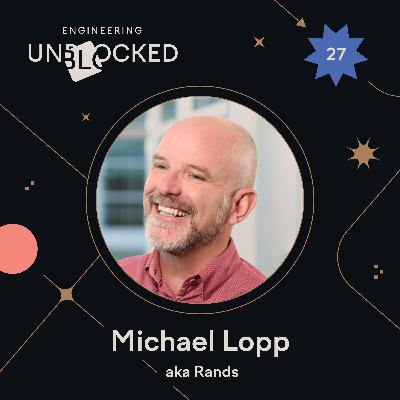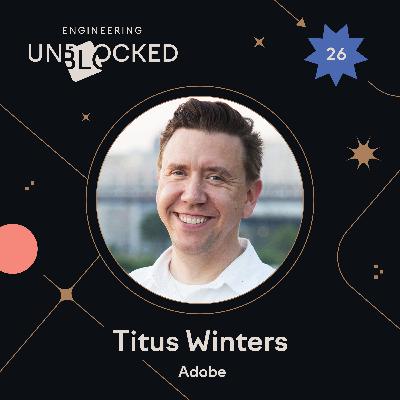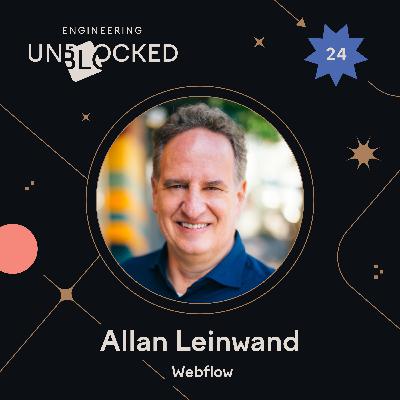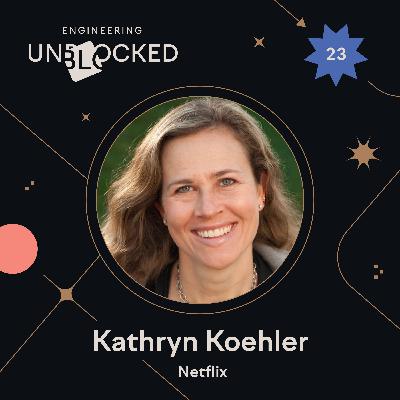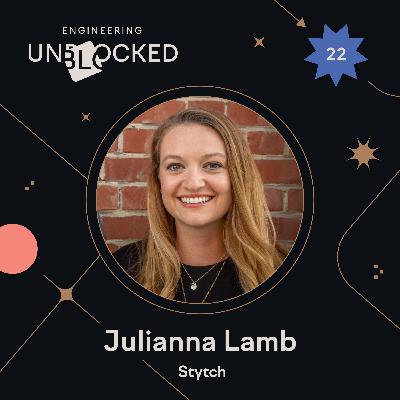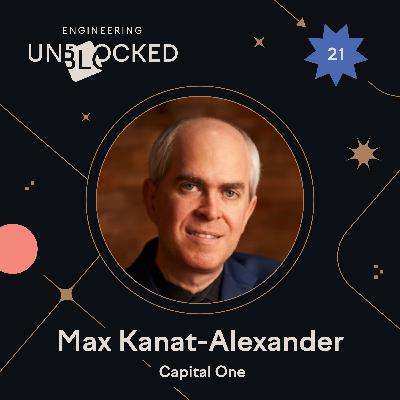Discover Engineering Unblocked
Engineering Unblocked

Engineering Unblocked
Author: Swarmia
Subscribed: 127Played: 541Subscribe
Share
© Swarmia
Description
Keeping software engineers in flow and unblocked is one of the key responsibilities of software development leaders. In each episode of the Engineering Unblocked podcast, Rebecca Murphey interviews leaders who have navigated challenges of scale, complexity, and growth. You’ll hear from people with lived experience across the software development ecosystem, from CTOs and VPEs to directors and line managers to product managers, program managers, tech leads, and more.
27 Episodes
Reverse
In this episode, Michael Lopp shares what he's learned leading engineering teams at Slack, Pinterest, and Palantir — including why AI is delivering real but modest productivity gains, and why junior engineers churning out AI-generated code is probably slowing teams down.Michael Lopp (Rands) brings three decades of engineering leadership experience to the AI conversation — revealing why he thinks we're experiencing another bubble similar to the dotcom era, but moving much faster. He's bullish on the technology but realistic: AI enables 5-10% productivity gains for complex work, not the revolutionary changes some expect. His framework emphasizes that good leadership still requires empathy, one-on-ones, and actually listening to your team.Find the transcript at: https://www.swarmia.com/podcast/michael-lopp-rands/(0:00) Introduction(2:45) Are we living in another dotcom bubble?(11:12) AI doesn't replace critical thinking(15:34) The problem with measuring the productivity impact of AI(18:01) Your job as a human is to know when you're being lied to(19:40) What junior engineers need to learn now(24:16) Assessing team health and psychological safety at scale(28:12) What happens at 150 headcount(30:21) Are companies buying AI tools without a hypothesis?(33:11) The fakers(35:22) Rands’ advice on leading through hard times(42:18) Why telling managers to stop coding was a bad idea(45:25) Rands’ hot take on the industryFollow Michael on LinkedIn: https://www.linkedin.com/in/michaelloppFollow Rebecca on LinkedIn: https://www.linkedin.com/in/rmurphey/
In this episode, Titus Winters discusses his framework for optimizing software’s commercial value, why having humans in the deploy phase is pure toil, and how to think about engineering productivity investments.Titus Winters brings infrastructure thinking to software economics — revealing why manual deployment processes are pure overhead and how to quantify the true cost of defects with a (sometimes) simple formula. His framework splits software into three phases: creative development, factory-like deployment, and operational maintenance, arguing that humans belong only in the first.Find the transcript at: https://www.swarmia.com/podcast/titus-winters-adobe/(0:00) Introductions(3:58) Why Titus is drawn to this space(6:21) How do you measure the impact of preventing a bug?(8:36) How this paper came to be(10:45) Why is it so hard for non-technical leadership to understand engineering?(12:42) How relevant is the framework for smaller organizations?(13:52) Estimating the true cost of defects(17:40) Measure systems, not individuals(18:25) Why humans in the deployment loop are pure toil(22:17) Why DORA doesn’t measure the squishy, creative part of software development(27:26) Infrastructure investment below 10% kills companies(29:39) Changes in regulations that affect software companies(31:36) How much should organizations spend on ‘platformization’(36:00) Why teams should run at 70% capacity, not 100%(40:15) Product vs engineering responsibilities(42:04) Titus’ hot take on AI(44:55) Where to find the paperFollow Titus on LinkedIn: https://www.linkedin.com/in/tituswinters/Follow Rebecca on LinkedIn: https://www.linkedin.com/in/rmurphey/
In this episode of Engineering Unblocked, Rebecca talks with Charity Majors, CTO of Honeycomb, to explore the myths of engineering productivity and the importance of building systems that enable “normal” engineers to succeed.Charity Majors tears down the myths of engineering exceptionalism — challenging the tech industry's worship of “10x developers” and advocating for systems that empower everyday engineers. She reveals how true organizational effectiveness emerges from resilient teams and a genuine connection between technical work and business strategy.Find the transcript at: https://www.swarmia.com/podcast/charity-majors-honeycomb/Timestamps(0:00) Introductions(1:26) Hiring normal engineers over the '10x developer'(4:40) The fundamental attribution error: looking at individuals over the system(6:24) What non-engineering leadership need to know about engineering(7:28) The ingredients of a normal-engineer optimized system(8:40) Why diverse teams are resilient teams(9:26) What creates 10x leverage?(11:42) Developer productivity metrics and what actually matters(14:20) Charity's take on the 'sh*t umbrella' school of management(16:30) How Honeycomb creates space for productivity to happen(19:28) The IC to manager journey(21:44) Why becoming a manager out of reaction can harm your team(23:19) Is the engineering manager level being eliminated?(25:23) Going back to being an IC isn't career limiting(30:45) Why Charity chooses to speak up and out(32:00) Charity's current hot-not-hot-take on the software industryFollow Charity on LinkedIn: https://www.linkedin.com/in/charity-majors/Follow Rebecca on LinkedIn: https://www.linkedin.com/in/rmurphey/
In this episode of Engineering Unblocked, Rebecca sits down with Allan Leinwand, Chief Technology Officer at Webflow and serial engineering leader who has scaled teams at Slack, ServiceNow, and Shopify. Allan shares his unique perspective on what it takes to be a successful “scaling CTO” — the type of leader who comes in at inflection points to help companies hockey-stick their growth.Allan also offers insights on navigating the AI revolution in engineering — from how it’s changing the hiring process and accelerating junior developer growth, to using it for everything from code completion to writing performance reviews. With his background spanning from early Cisco networking to modern SaaS platforms, Allan brings a unique long-term perspective on technology evolution and what it means to build engineering organizations that can scale to serve millions of users worldwide.Find the transcript at: https://www.swarmia.com/podcast/allan-leinwand-webflow/Timestamps(0:00) Introductions(1:37) Allan's role as CTO(6:04) Staying in touch with the reality of software engineers(8:40) Similarities between leadership roles(11:09) Encountering founder mentality(13:00) The key to success as a CTO(16:23) How Webflow uses AI(19:37) How AI is affecting the hiring process(21:44) Hiring juniors(25:35) How AI is changing other roles(27:22) Webflow's approach to performance management(32:32) Mitigation strategies to maintain productivity(36:27) How Allan approaches reorgs(39:46) Who Allan feels accountable to(42:58) Creating a culture of accountabilityFollow Allan on LinkedIn: https://www.linkedin.com/in/aleinwand/Follow Rebecca on LinkedIn: https://www.linkedin.com/in/rmurphey/
In this episode of Engineering Unblocked, Rebecca sits down with Kathryn Koehler, Director of Developer Productivity at Netflix, to explore the unique challenges of scaling engineering at a 20-year-old company.The conversation dives deep into the complexities of building versus buying solutions, managing migrations across a multi-repo environment, and maintaining Netflix’s culture of freedom and responsibility, while providing the standardization that enables productivity at scale. Kathryn offers practical insights on everything from measuring productivity (hint: it’s not about lines of code) to navigating the current AI hype cycle with a level head.Find the transcript at: https://www.swarmia.com/podcast/kathryn-koehler-netflix/Timestamps(0:00) Introductions(1:14) Kathryn's background and journey to Netflix(5:27) Solving problems at a 20-year-old company(9:01) Defining productivity and platform(13:05) Kathryn's approach to standardization(16:50) How Netflix handles migrations(20:36) Deciding what to work on(23:26) Maintaining utility per engineer(27:36) The importance of mindset(31:25) Metrics of productivity(36:25) What Kathryn is accountable for(37:50) Kathryn's thoughts on AIFollow Kathryn on LinkedIn: https://www.linkedin.com/in/kakoehler/Follow Rebecca on LinkedIn: https://www.linkedin.com/in/rmurphey/
In this episode of Engineering Unblocked, Rebecca sits down with Julianna Lamb, co-founder and CTO of Stytch, to explore the challenges of building and scaling engineering culture at a fast-growing startup.Julianna shares her journey from Plaid to founding an authentication and fraud prevention platform, and dives deep into the cultural decisions that shaped Stytch's 30-person engineering team. From establishing quality practices and developer experience from day one to navigating the balance between speed and reliability, Julianna offers practical insights on maintaining culture through growth. They also discuss how AI is reshaping engineering interviews and the evolving role of junior developers in 2025. Find the transcript at: https://www.swarmia.com/podcast/julianna-lamb-stytch/Timestamps(0:00) Introductions(0:32) Julianna's background and path to Stytch(3:08) About the structure of Stytch(5:30) Julianna's approach to team growth(9:30) Early investments as a start-up(12:36) About Stytch's culture(17:10) Ensuring quality through testing(19:58) Ownership of internal tooling(22:24) Maintaining a culture of speed(25:09) Managing quality through growth(28:23) The importance of culture fit(31:53) AI's impact on junior engineers(35:00) How Stytch interviews in 2025(40:32) Julianna's ambitions for the futureFollow Julianna on LinkedIn: https://www.linkedin.com/in/juliannaelamb/Follow Rebecca on LinkedIn: https://www.linkedin.com/in/rmurphey/
In this episode, Rebecca sits down with Max Kanat-Alexander, Executive Distinguished Engineer for Developer Experience at Capital One, to explore the nuances of developer productivity and experience. The conversation dives deep into what actually drives — and what kills — productivity in engineering organizations. Max shares hard-won insights about why most developer experience initiatives fail (hint: it’s about not understanding your users), the critical difference between being productive as individuals versus as teams and organizations, and why treating engineers as “ticket takers” destroys software quality.Find the transcript at: https://www.swarmia.com/podcast/max-kanat-alexander-capital-one/Timestamps(0:00) Introductions(0:48) Max’s journey to Capital One(2:58) Unsuccessful developer productivity(5:37) Doing the ‘right’ work(11:01) Ticket-taker culture(15:25) Drivers of productivity(20:32) Performing KTLO work(25:40) Drivers and detractors of effective software delivery(33:16) Setting goals(40:42) The future of coding with AI(46:36) Max’s advice to junior engineersFollow Max on LinkedIn: https://www.linkedin.com/in/mkanat/Follow Rebecca on LinkedIn: https://www.linkedin.com/in/rmurphey/
Mason Jones recently started a new role at Zapier, where he’s bringing his platform leadership experience from Lattice and Credit Karma.
In this episode, Mason shares his thoughts on what makes a platform team work, common tradeoffs in platform development, and the challenges of making your team’s work visible and understandable to the whole organization.
Find the transcript at: https://www.unblocked.fm/episodes/mason-jones-zapier/
Timestamps
(0:00) Introductions
(0:39) Mason’s journey to Zapier
(4:39) How Mason joined the platform team
(8:48) Naming teams
(11:10) The mechanics of reorienting
(15:46) Transitioning from infrastructure to platform
(20:44) Goal-setting using data
(24:39) Mason’s take on product managers
(28:48) Detangling a monolith into services
(33:49) Federating vs. centralizing
(37:04) How Mason approaches standardization
(41:22) How to communicate
(44:58) The value of case studies
(47:08) What Mason wants to achieve in a year
Follow Mason on LinkedIn: https://www.linkedin.com/in/masonjones/
Follow Rebecca on LinkedIn: https://www.linkedin.com/in/rmurphey/
Links and mentions
• Zapier: https://zapier.com/
• Credit Karma: https://www.creditkarma.com/
Alice Bartlett, Tech Director for Customer Products at the Financial Times, shares what it takes to introduce modern technology to a 136-year-old company and how to successfully lead significant efforts to re-architect understandable but unfortunate decisions of the past.
In this episode, Rebecca and Alice dig deep on one of those decisions and how she got the work funded and how she got the work done.
Find the transcript at: https://www.unblocked.fm/episodes/alice-bartlett-financial-times/
Timestamps
(0:00) Introductions
(1:06) Alice’s journey to the FT
(5:17) About the FT’s pink paper
(7:20) The FT’s history of innovation
(11:52) Organizational changes at the FT
(13:54) How Alice fixed an architectural flaw
(19:34) The importance of communication
(24:21) Changing an overly-complicated system
(27:02) Blameless culture
(29:15) How Alice keeps engagement high
(32:40) Maintaining the new system
(34:53) All-use cases and bugs
(39:19) Alice’s take on tech
Follow Alice on LinkedIn: https://www.linkedin.com/in/alicebartlett/
Follow Rebecca on LinkedIn: https://www.linkedin.com/in/rmurphey/
Links and mentions
• Financial Times: https://www.ft.com/
• The Pragmatic Programmer: https://www.amazon.com/Pragmatic-Programmer-Journeyman-Master/dp/020161622X
Colleen Tartow, Field CTO and Head of Strategy at VAST Data, shares her experience from years in data engineering leadership roles.
In this episode, Rebecca and Colleen talk about how “data” has evolved over the years, how AI is turning everything we know about data upside down, and how a PhD in Astrophysics got her started on this path.
Find the transcript at: https://www.unblocked.fm/episodes/colleen-tartow-vast/
Timestamps
(0:00) Introductions
(0:44) Colleen’s background
(3:01) About VAST’s approach
(7:18) Unique challenges of data engineering
(10:56) Setting reasonable expectations
(13:34) The importance of process
(16:29) The future of data engineering
(21:00) What Colleen misses about engineering
(22:39) How to set goals for a data organization
(25:58) Colleen’s perspective on people in business
(29:58) Colleen’s unusual path to data
Follow Colleen on LinkedIn: https://www.linkedin.com/in/colleen-tartow-phd/
Follow Rebecca on LinkedIn: https://www.linkedin.com/in/rmurphey/
Links and mentions
• VAST Data: https://www.vastdata.com/
Andrea Corey is a VP of Engineering for platform engineering at Homebase.
In today’s episode, Rebecca and Andrea talk about Andrea’s experience in working at scaleups, the lessons she’s learned, the pitfalls she’s trained herself to avoid, and some of the biggest problems leaders need to solve as their organization grows.
Find the transcript at: https://www.unblocked.fm/episodes/andrea-corey-homebase/
Timestamps
(0:00) Introductions
(0:46) Andrea’s background
(4:37) Unlocking potential among teams
(7:02) About Homebase’s team strategy
(11:26) Tips to make ideas a reality
(15:20) How Andrea manages multiple teams
(18:11) Countering hero culture
(21:44) Incident handling
(25:19) Setting goals around incidents
(27:23) Avoiding past mistakes
(33:45) When to federate vs. centralize
(37:01) Who Andrea wants to be
Follow Andrea on LinkedIn: https://www.linkedin.com/in/andreacorey/
Follow Rebecca on LinkedIn: https://www.linkedin.com/in/rmurphey/
Links and mentions
• Homebase: https://joinhomebase.com/
• FreshBooks: https://www.freshbooks.com/
• Eloqua: https://www.oracle.com/cx/marketing/automation/
Liz Hustedt is a Senior Engineering Manager at ActBlue, an American political action committee and fundraising platform established serving left-leaning and Democratic nonprofits and politicians.
In today’s episode, Rebecca and Liz talk about how Liz’s early experience as an ICU nurse shaped her leadership skills and style, and about managing change in a way that’s empathetic to where the organization is at the moment.
Find the transcript at: https://www.unblocked.fm/episodes/liz-hustedt-actblue
Timestamps
(00:00) Introductions
(00:50) Liz’s background
(04:00) About ActBlue and Liz’s experience there
(08:55) Understanding team health
(12:35) Building trust
(15:15) Roadmap planning
(20:07) How Liz and her team are evaluated
(21:21) About outcome-driven goals
(26:26) Tips to transition towards outcome-driven goals
(28:59) Skills needed in management
(34:34) Managing through change
(40:50) Milestones and who Liz wants to be
Follow Liz on LinkedIn: https://www.linkedin.com/in/lizhustedt/
Follow Rebecca on LinkedIn: https://www.linkedin.com/in/rmurphey/
Links and mentions
• ActBlue: https://secure.actblue.com/
Scott Bonneau is the EVP of Product and Operations at Karat, the end-to-end solution for technical hiring. Before Karat, Scott has worked in various engineering and HR roles at Google and Indeed.
In today’s episode, Rebecca and Scott discuss Scott’s career at the intersection of technology and people, how leaders can win the trust of a team that they’ve inherited, and how the tech industry has changed over the past 30 years.
Find the transcript at: https://www.unblocked.fm/episodes/scott-bonneau-karat
Timestamps
(00:00) Introductions
(02:18) Scott’s journey to his current role
(07:10) About Karat
(11:05) The role of EVP Product & Operations at Karat
(15:43) How to keep everyone close to the ultimate company goal
(22:15) Navigating low-trust environments
(27:15) What has changed in tech industry during Scott’s career
(30:40) How AI is going to change in the tech industry — especially for junior engineers
(35:35) What is changing with regards to the hire-ability of developers
(38:01) Where you can find Scott play music
Follow Scott on LinkedIn: https://www.linkedin.com/in/bonneau/
Follow Rebecca on LinkedIn: https://www.linkedin.com/in/rmurphey/
Links and mentions
• Karat: https://karat.com/
• Indeed: https://www.indeed.com/
• The Five Dysfunctions of a Team: https://www.tablegroup.com/product/dysfunctions/
In today’s episode, Rebecca chats with Kristen Foster-Marks, Head of Developer Experience at Depot. They discuss questionable “ghost engineer” research, why ethical, rigorous studies matter, and how developer experience makes a difference—even in a tough economy.
Find the transcript at: https://www.unblocked.fm/episodes/kristen-foster-marks-depot/
Timestamps
(0:00) Introductions(0:56) Kristen’s role at Depot(3:44) Defining science in developer experience(8:56) The “ghost engineers” controversy(16:02) Balancing peer review with research(19:17) What Kristen wants from quality research(22:09) Why developer experience matters(25:46) Developer experience in the modern world(29:58) The need for empirical studies(34:23) How sample sizes affect research validity(37:18) Replicating qualitative research(39:18) Applying research in practice
Follow Kristen on LinkedIn: https://www.linkedin.com/in/kristenfostermarks/
Follow Rebecca on LinkedIn: https://www.linkedin.com/in/rmurphey/
In today’s episode, Rebecca talks with Nathen Harvey who leads the DORA group at Google Cloud. Nathen shares insights from the 10th annual DORA report, covering topics like the relationship between AI adoption and software stability, the importance of transformational leadership, and the role of quality documentation.
Find the transcript at: https://www.unblocked.fm/episodes/nathen-harvey-google-cloud/
Timestamps
(0:00) Introductions
(0:24) Nathen’s journey to DORA
(3:21) The 10th annual DORA report
(6:20) How DORA collects data on AI
(11:52) Testing hypotheses with qualitative data
(13:49) Communicating technical concepts to non-technical stakeholders
(20:04) The importance of transformational leadership
(26:08) Qualifying productivity and value in developers
(32:15) About quality documentation
(35:45) Handling engineers who are afraid of DORA
(38:55) Setting goals and continuous improvement
Follow Nathen on LinkedIn: https://www.linkedin.com/in/nathen/
Follow Rebecca on LinkedIn: https://www.linkedin.com/in/rmurphey/
Links and mentions
• DORA Accelerate State of DevOps report: https://cloud.google.com/resources/devops/state-of-devops
In today’s episode, Rebecca talks with Iccha Sethi, the new VP of Engineering at Vanta. They discuss taking stock of an engineering organization as a new VP, how technical engineering managers need to be, and her work at Github, Atlassian, Invision, and now Vanta around operational health.
Find the transcript at: https://www.unblocked.fm/episodes/iccha-sethi-vanta
Timestamps
(0:00) Introductions
(0:52) About Vanta
(4:55) Engineering and cultural challenges
(10:50) Operational health for platform teams
(15:19) Communicating with non-tech leaders
(18:53) How Vanta handles incidents
(23:36) On strategic remediation and incidents
(29:14) Involving everyone in the conversation
(33:19) Common operational health mistakes
(37:06) About being an approachable VPE
(40:44) Practices to manage team meetings
Follow Iccha on LinkedIn: https://www.linkedin.com/in/icchasethi
Follow Rebecca on LinkedIn: https://www.linkedin.com/in/rmurphey/
Links and mentions
• Vanta: https://www.vanta.com/
Lena Reinhard has been a software engineer, a cofounder, and a vice president of engineering, including leadership stints at Travis CI and CircleCI.
These days, she’s an engineering leadership coach and consultant. On today’s episode, Rebecca and Lena talk about those experiences, and how they’ve shaped Lena’s perspective of engineering management and managing with metrics.
Find the transcript at: https://www.unblocked.fm/episodes/lena-reinhard-introducing-metrics-to-an-engineering-organization
Timestamps
(00:00) Introductions
(00:49) How Lena accidentally got into tech from a finance background
(02:33) Lena’s current role as an engineering leadership coach
(03:00) What drew Lena into developer tools
(05:10) Maintaining situational awareness as a leader of a large engineering organization
(06:15) The two purposes of engineering metrics
(12:20) How Lena helps engineering organizations drive visibility
(17:19) Leading indicators to a visibility problem
(21:23) Introducing engineering metrics in a low-trust environment
(27:25) How (not) to roll out a metrics program
(28:25) The failure mode in running employee engagement surveys
(30:37) Lena’s biggest learnings in rolling out metrics programs
(36:16) How to get in touch with Lena
Where to find Lena
• LinkedIn: https://www.linkedin.com/in/lenareinhard/
• Twitter: https://twitter.com/lrnrd
Where to find Rebecca
• LinkedIn: https://www.linkedin.com/in/rmurphey/
• Twitter: https://twitter.com/rmurphey
Links and mentions
• Lena's website: https://www.lenareinhard.com/
• What engineering metrics should I use? A guide for engineering managers, directors, and leaders: https://www.lenareinhard.com/articles/what-engineering-metrics-should-i-use-a-guide-for-engineering-managers-directors-and-vps
• How to roll out and use engineering metrics successfully: https://www.lenareinhard.com/articles/how-to-introduce-engineering-metrics-successfully
Grant Jenks is a Senior Staff Software Engineer at LinkedIn.
In this episode of Engineering Unblocked, Rebecca and Grant discuss how LinkedIn approaches the challenges of keeping its software engineers (and others) happy and productive, and how the Engineering Insights organization informs its work and the work of teams across LinkedIn.
Find the transcript at: https://www.unblocked.fm/episodes/grant-jenks-linkedin-like-a-fitbit-for-engineering-teams
Timestamps
(00:00) Introductions
(01:00) Grant’s current role and his career journey
(03:51) The origins of the productivity organization at LinkedIn
(05:22) From building “tools” to maintaining critical development infrastructure
(06:40) Incorporating commodity tools
(08:06) Choosing which problems to solve
(09:21) How the team’s metrics inform work across LinkedIn
(12:05) Using the metrics to help teams set goals
(13:30) Choosing the right metrics for the problem
(15:32) Unique user problems at scale
(18:07) Different problems and different perceptions for different personas
(23:09) Working with productivity champions at the team level
(23:40) Defining “happiness” and soliciting feedback
(28:05) Spotting trends in the sentiment data, and choosing the right cadence
(30:26) The product is productivity, and users can do surprising things
(34:00) Making change happen at scale
(38:33) Using metrics in a productivity emergency
Where to find Grant
• LinkedIn: https://www.linkedin.com/in/grantjenks/
• Twitter: https://twitter.com/Grant_Jenks
Where to find Rebecca
• LinkedIn: https://www.linkedin.com/in/rmurphey/
• Twitter: https://twitter.com/rmurphey
Links and mentions
• LinkedIn: https://www.linkedin.com/
• GitHub Codespaces: https://github.com/features/codespaces
• Horizontal initiatives at LinkedIn: https://engineering.linkedin.com/blog/2018/03/scaling-decision-making-across-teams-within-linkedin-engineering
• Artifactory: https://jfrog.com/artifactory/
Ben Vinegar has spent the last 8 years at Sentry in a variety of roles, from Software Engineer to VP of Engineering.
Today, Rebecca and Ben discuss non-linear careers, engineering career ladders, acquisitions, and more.
Find the transcript at: https://www.unblocked.fm/episodes/ben-vinegar-sentry-reflecting-on-ladders-acquisitions-and-personal-trajectory
Timestamps
(00:00) Introduction
(01:26) Third-Party JavaScript and Sentry
(02:33) Ben’s journey to VP of Engineering
(03:24) Sentry’s growth
(05:08) The ladder: differentiating engineering levels
(08:45) How Ben became the Co-VP of Engineering
(12:42) A new role focused on innovation
(16:40) Building an emerging tech team
(19:26) Preserving innovation outside the innovation team
(21:37) Lessons from acquisitions
(26:11) Leading Syntax.fm
(28:34) A company within a company
(30:36) Non-linear careers
Where to find Ben
• LinkedIn: https://www.linkedin.com/in/benvinegar/
• Twitter: https://twitter.com/bentlegen
Where to find Rebecca
• LinkedIn: https://www.linkedin.com/in/rmurphey/
• Twitter: https://twitter.com/rmurphey
Links and mentions
• Sentry: https://sentry.io/
• Third-Party JavaScript, a book by Ben Vinegar and Anton Kovalyov: https://www.manning.com/books/third-party-javascript
• Disqus: https://disqus.com/
• Shape Security (now part of F5): https://www.f5.com/cloud/products/bot-defense
• Specto (a Sentry acquisition): https://sentry.io/about/press-releases/sentry-acquires-analytics-firm-specto-to-add-continuous-profiling-to-mobile-application-monitoring/
• Syntax.fm (a recent Sentry acquisition): http://Syntax.fm
Niilo is the CTO of Wolt, a subsidiary of DoorDash. In this episode, he talks to Swarmia founder and CEO Otto Hilska about lessons learned while rapidly scaling an engineering organization.
Timestamps
(0:23) Niilo’s background
(03:49) Where to focus first
(06:02) Product management in a 3-way marketplace
(07:36) Principles-driven development
(09:18) Turning “big things” into reality
(12:26) Choosing the right work
(15:18) Staying close to the customer
(17:26) The culture at Wolt
(21:17) A high bar for excellence, driven by data
(24:11) Recruiting and hiring
(32:43) Growth & Growing Pains
(41:30) Ownership and standardization
(47:11) Niilo’s journey
Find the transcript: https://unblocked.fm/episodes/niilo-säämänen-cto-scaling-wolt
Where to find Niilo
LinkedIn: https://www.linkedin.com/in/niilosaamanen
Where to find Otto
LinkedIn: https://www.linkedin.com/in/hilska
Twitter: https://twitter.com/mutru
Where to find Rebecca
LinkedIn: https://www.linkedin.com/in/rmurphey
Twitter: https://twitter.com/rmurphey
Links and mentions
Wolt: https://wolt.com/en
High Output Management: https://www.amazon.com/High-Output-Management-Andrew-Grove/dp/0679762884
Marty Cagan books: https://www.amazon.com/stores/Marty-Cagan/author/B00J21JTNM
Project Aristotle: https://rework.withgoogle.com/print/guides/5721312655835136/


